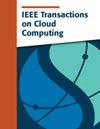Game-Based Low Complexity and Near Optimal Task Offloading for Mobile Blockchain Systems
IF 5.3
2区 计算机科学
Q1 COMPUTER SCIENCE, INFORMATION SYSTEMS
引用次数: 0
Abstract
The Internet of Things (IoT) finds applications across diverse fields but grapples with privacy and security concerns. Blockchain offers a remedy by instilling trust among IoT devices. The development of blockchain in IoT encounters hurdles due to its resource-intensive computation processing, notably in PoW-based systems. Cloud and edge computing can facilitate the application of blockchain in this environment, and the IoT users who want to mine in blockchain need to pay the computation resource rent to the Cloud Computing Service Provider (CCSP) for offloading the mining workload. In this scenario, these IoT miners can form groups to trade with CCSP to maximize their utility. In this paper, a mixed model of the Stackelberg game and coalition formation game is embraced to address the grouping and pricing issues between IoT miners and CCSP. In particular, the Stackelberg game is utilized to handle the pricing problem, and the coalition formation game is employed to tackle the best group partition problem. Moreover, a coalition formation algorithm is proposed to obtain a near-optimal solution with very low complexity. Simulation results show that our proposed algorithm can obtain a performance that is very near to the exhaustive search method, outperforms other existing schemes, and requires only a small computation overhead.基于游戏的移动区块链系统的低复杂性和近乎最优的任务卸载
物联网(IoT)在各个领域都有应用,但却存在隐私和安全问题。区块链通过在物联网设备之间建立信任提供了一种补救措施。在物联网中开发区块链会遇到资源密集型计算处理的障碍,特别是在基于 PoW 的系统中。云计算和边缘计算可以促进区块链在该环境中的应用,想要在区块链中挖矿的物联网用户需要向云计算服务提供商(CCSP)支付计算资源租金,以卸载挖矿工作量。在这种情况下,这些物联网矿工可以组成小组与CCSP进行交易,以实现效用最大化。本文采用斯塔克尔伯格博弈和联盟形成博弈的混合模型来解决物联网矿工与 CCSP 之间的分组和定价问题。其中,斯塔克尔伯格博弈用于处理定价问题,联盟形成博弈用于处理最佳分组问题。此外,我们还提出了一种联盟形成算法,以极低的复杂度获得接近最优的解决方案。仿真结果表明,我们提出的算法可以获得与穷举搜索法非常接近的性能,优于其他现有方案,而且只需少量计算开销。
本文章由计算机程序翻译,如有差异,请以英文原文为准。
求助全文
约1分钟内获得全文
求助全文
来源期刊

IEEE Transactions on Cloud Computing
Computer Science-Software
CiteScore
9.40
自引率
6.20%
发文量
167
期刊介绍:
The IEEE Transactions on Cloud Computing (TCC) is dedicated to the multidisciplinary field of cloud computing. It is committed to the publication of articles that present innovative research ideas, application results, and case studies in cloud computing, focusing on key technical issues related to theory, algorithms, systems, applications, and performance.
 求助内容:
求助内容: 应助结果提醒方式:
应助结果提醒方式:


